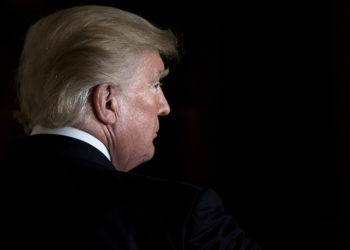President Donald Trump’s recent public spat with Senate Majority Leader Mitch McConnell, while unusual in American politics, is not unprecedented in American history.
The position of Senate majority leader, which began in the early twentieth century, has usually been seen as one who balances and negotiates the opinions and preferences of a majority of Senators with those of the president. The typical outcome is the promotion of the president’s agenda when he and the Senate majority are of the same party. There are two main reasons for this shared agenda – first a president and Senators from the same party generally share the same ideological opinions; and second, there is some self-interest in helping a president from the same party to be successful when Senators are up for re-election.
On two occasions in the past hundred years, disputes between a president and Senate majority leader of the same party became serious enough for the latter to resign. By 1944, Democratic Majority Leader Alben Barkley had proven over seven years usually to be a loyal supporter of President Franklin D. Roosevelt. But when FDR sent proposed legislation to Congress in January 1944 to increase tax revenue by $10 billion to pay for World War II efforts, senators refused to go along and approved a bill with only a $2 billion increase and some tax breaks for business interests. FDR vetoed the bill, calling it “relief not for the needy, but for the greedy” in his veto message.
Barkley then met with Senate Democrats, and clearly upset, he resigned his position as majority leader and left the room. Senate Democrats immediately re-elected Barkley as majority leader, which was seen as an assertion of Senate independence. The House of Representatives and Senate then both overrode the president’s veto of the revenue bill. Barkley later became vice president under Harry Truman in 1949.
In December 2002, Republican Senate Majority Leader Trent Lott of Mississippi gave an address at a 100th birthday party for Republican Senator Strom Thurmond of South Carolina. Mr. Thurmond, who got his start in national politics as a supporter of racial segregation during a 1948 presidential candidacy, had by 2002 become the oldest person ever to serve in Congress.
Thurmond’s States’ Rights Democrats won the electoral votes of four Southern states in the 1948 presidential election from voters upset about government decisions such as President Truman’s executive order to allow whites and blacks to serve together in the military and to end racial discrimination in the armed services.
During his 2002 address, while standing next to a seated Thurmond, The Washington Post reported that Majority Leader Lott said: “I want to say this about my state: When Strom Thurmond ran for president, we voted for him. We’re proud of it. And if the rest of the country had followed our lead, we wouldn’t have had all these problems over all these years.”
Mr. Lott, who had previously received publicity for opposing major civil rights legislation and for speaking to a white nationalist group and welcoming its members to his Washington office, was publicly criticized by Republican President George W. Bush. His brother and Florida Governor Jeb Bush and Secretary of State Colin Powell joined in the public criticism. Mr. Lott resigned as Senate Majority Leader later in the month.
But while disputes between Presidents and Senate majority leaders of the same party may not be unprecedented, the nature and rhetoric of the current public spats are.
On Twitter, a social media outlet not available to Presidents Bush or Roosevelt, Trump has alternated between criticism of Mr. McConnell’s incompetence due to his inability to get an Obamacare repeal bill passed and cheerleading McConnell to get back to work with a “You can do it!” Mr. McConnell’s response has largely been to ignore President Trump’s comments except with the observation that Mr. Trump may have “had excessive expectations about how quickly things happen in the democratic process.”
FDR never publicly attacked Barkley in 1944 and instead sent him a telegram asking him not to resign as majority leader and supporting his re-election to the position if he did resign. But President Bush did strongly criticize the Lott comments of 2002, without calling on Mr. Lott to resign, a situation similar to Mr. Trump’s noncommittal response so far on whether McConnell should stay as majority leader or resign. In 2002, Mr. Bush was concerned about the impact of perceived racist rhetoric on Republican election efforts, while Mr. Trump seems more concerned about the Senate’s inability to deliver on his campaign promises.
It’s not clear yet whether Trump’s criticisms will have an impact. If the intent is to rally conservative forces to pressure Mr. McConnell to resign, there have not yet been any coordinated public efforts to do so, as there were in 2002 with Mr. Lott. If the intent is for President Trump to let Mr. McConnell know through public admonishments that the White House isn’t happy with his current work, that could backfire.
During his presidential campaign, President Trump once tweeted that Senator John McCain of Arizona was a “dummy” and stated that Mr. McCain was not a war hero because he had been captured, with Mr. Trump adding that he liked people who weren’t captured. When Mr. McCain made a dramatic return to Washington from Arizona last month after a diagnosis of a brain tumor, President Trump cheered Mr. McCain’s effort to vote on the upcoming Obamacare repeal bill, calling him an “American hero.” Then Mr. McCain voted against the final repeal bill.
While Mr. McCain publicly called for changes in the health care system to be made through regular legislative order with committee hearings and bipartisan meetings, it seems likely that Mr. Trump’s past insults may have played some role in allowing Mr. McCain to feel content with damaging President Trump’s legacy and ruining Mr. Trump’s claims that he would get things done as president.
President Trump tried the same tactics with Republican Senator Lisa Murkowski of Alaska through public criticism of her vote against proceeding to debate the Obamacare repeal bill in the Senate. Despite the criticism from the president, Ms. Murkowski continued to vote against the various Obamacare repeal proposals.
President Trump is used to running a business where people work for him and carry out tasks and goals he assigned to them. The Senate and senators do not work for him – he can’t fire them, and public insults about their decisions or their competence will probably not help him to reach his goals. Mr. Trump campaigned on being a master dealmaker – if he wants to achieve any political promises, it’s time to make some deals.
Disclaimer: The views and opinions expressed here are those of the author and do not necessarily reflect the editorial position of The Globe Post.




















